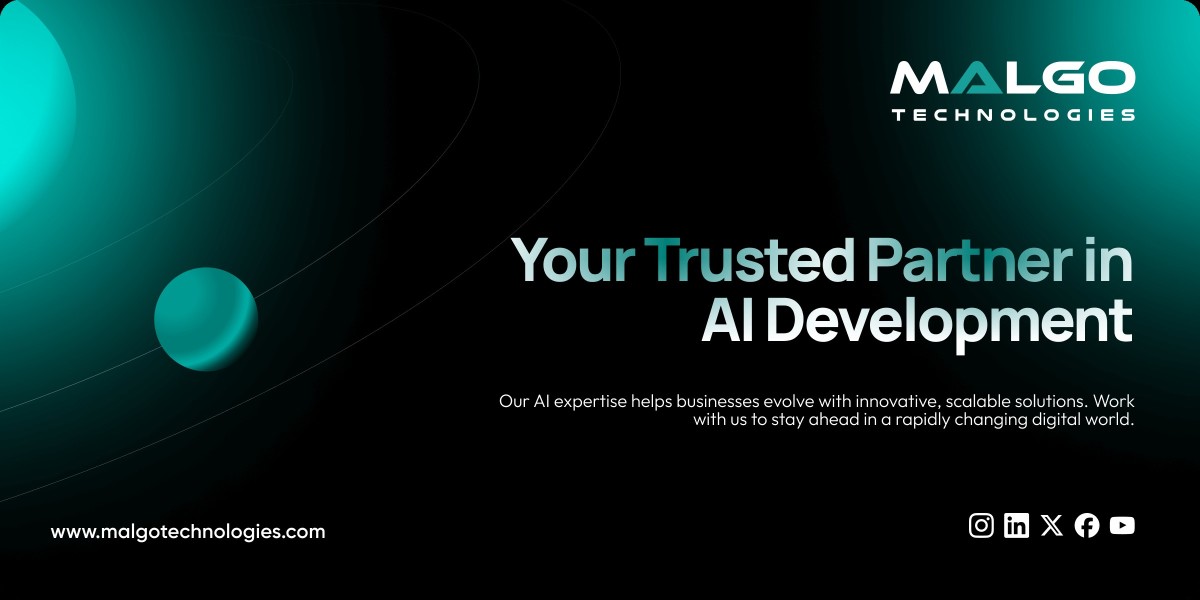Introduction to AI Development for Enterprises
Artificial Intelligence has moved from being a research concept to a core driver of enterprise growth. Businesses across industries—from manufacturing and retail to finance and healthcare—are increasingly investing in AI-driven systems to improve efficiency, accuracy, and decision-making. An AI development company provides enterprises with the expertise and infrastructure needed to create intelligent applications that solve real business problems.
AI development is not just about building models. It includes the entire lifecycle of strategy, data engineering, model development, deployment, and monitoring. For enterprises, this translates into solutions that improve operations, automate repetitive processes, enhance customer experience, and generate actionable insights.
Why Enterprises Need Smart AI Applications?
Enterprises today manage large amounts of structured and unstructured data. Without intelligent systems, much of this data remains underutilized. Smart AI applications bring structure, predictions, and adaptability into decision-making processes.
Key reasons why enterprises adopt AI applications include:
Automation of repetitive tasks – Reducing manual workload in areas like document processing, data entry, and customer service.
Predictive analytics – Forecasting trends, customer behavior, and market demands.
Personalization – Delivering customized recommendations for users, improving customer satisfaction and retention.
Operational efficiency – Optimizing workflows, supply chains, and resource allocation.
Cost savings – Reducing inefficiencies and minimizing human errors.
Core Services of an AI Development Company
An enterprise-focused AI development company offers more than just algorithm building. It integrates AI into existing systems, aligns it with business goals, and ensures scalability. Below are the main services enterprises expect:
1. AI Strategy and Consulting
Understanding business requirements and identifying areas where AI can provide measurable outcomes.
Creating an AI roadmap that aligns with enterprise goals and technology infrastructure.
Evaluating existing systems to assess AI-readiness.
2. Machine Learning Model Development
Building supervised, unsupervised, and reinforcement learning models.
Training models on enterprise-specific datasets.
Fine-tuning models for accuracy and reliability.
3. Natural Language Processing (NLP) Solutions
Development of chatbots and virtual assistants for customer support.
Sentiment analysis tools for brand monitoring.
Document and knowledge management using language understanding systems.
4. Computer Vision Applications
Image recognition and object detection for industries like manufacturing and healthcare.
Quality inspection through automated vision systems.
Smart surveillance and security systems.
5. Predictive Analytics and Forecasting
Building systems that anticipate demand fluctuations.
Enhancing financial forecasting with AI-driven insights.
Risk detection in operations and investments.
6. Intelligent Automation (AI + RPA)
Combining AI with Robotic Process Automation to handle end-to-end process automation.
Automating complex workflows beyond simple repetitive tasks.
Streamlining compliance checks and audits.
7. AI Integration with Enterprise Software
Embedding AI into CRM, ERP, and HR platforms.
Enhancing decision support systems with real-time recommendations.
Integrating AI-driven analytics into dashboards for executive teams.
Key Features of Smart AI Applications for Enterprises
Smart AI applications are designed to be scalable, adaptive, and enterprise-ready. The most important features include:
Scalability – Applications that can process growing data volumes and expand with business operations.
Interoperability – AI systems that integrate seamlessly with existing enterprise tools and infrastructure.
Real-time processing – Immediate insights for decision-making in critical business processes.
Data security – Strong focus on compliance, encryption, and governance of sensitive enterprise data.
Continuous learning – Models that improve over time with new data inputs.
Industry Applications of Enterprise AI
Different industries adopt AI development services based on their unique challenges. Here are key use cases:
Finance and Banking
Fraud detection using anomaly detection models.
AI-driven credit scoring systems.
Automated compliance monitoring.
Healthcare
AI-assisted diagnostics through medical imaging analysis.
Predictive models for patient readmission and treatment planning.
Virtual health assistants for patient engagement.
Retail and E-Commerce
Personalized shopping experiences through recommendation engines.
AI-powered chatbots for 24/7 support.
Inventory demand forecasting and supply chain optimization.
Manufacturing
Predictive maintenance of machinery.
Quality assurance with computer vision systems.
Optimization of production schedules.
Logistics and Supply Chain
Route optimization for faster deliveries.
Automated warehouse management.
Demand prediction to avoid shortages or overstocking.
Marketing and Customer Engagement
AI-driven campaign performance analytics.
Customer segmentation for targeted strategies.
Sentiment analysis to improve brand reputation management.
Benefits of Partnering with an AI Development Company
Enterprises that partner with a specialized AI development company gain access to structured processes, expert teams, and scalable frameworks. The benefits include:
Access to AI expertise – Skilled data scientists, engineers, and domain experts.
Faster implementation – Reduced time-to-market for enterprise AI applications.
Customizable solutions – AI models trained specifically for enterprise datasets and goals.
Cost efficiency – Optimized use of resources and reduction of manual inefficiencies.
Ongoing support – Continuous updates, monitoring, and model retraining for accuracy.
AI Development Process for Enterprises
Developing AI applications for enterprises requires a structured methodology. A typical process includes:
Requirement Analysis
Identifying business objectives.
Assessing current infrastructure and data availability.
Data Preparation
Collecting and cleaning enterprise datasets.
Ensuring quality and compliance of data.
Model Development
Designing algorithms based on use case.
Training models and testing performance.
Deployment and Integration
Deploying AI applications within enterprise systems.
Ensuring seamless integration with existing tools.
Monitoring and Maintenance
Continuous model evaluation.
Updating models as data and business requirements evolve.
Emerging Trends in AI Development for Enterprises
The field of enterprise AI continues to expand with new advancements. Some key trends include:
Generative AI adoption – Creating text, images, and synthetic data for enterprise use cases.
AI-driven cybersecurity – Intelligent systems detecting and preventing cyber threats.
Edge AI – Processing data closer to devices for faster results and reduced latency.
AI for sustainability – Optimizing energy usage and reducing environmental impact.
Augmented analytics – Simplifying data exploration for non-technical teams.
Challenges Enterprises Face in AI Adoption
While the opportunities are significant, enterprises face several challenges in AI adoption:
Data quality issues – Inconsistent or incomplete data affecting model accuracy.
Integration complexities – Difficulty in embedding AI into legacy systems.
Cost considerations – Initial investment in infrastructure and skilled resources.
Change management – Employee adoption of AI-driven systems.
Scalability – Ensuring AI models perform consistently with growing enterprise demands.
Conclusion
AI development companies play a central role in helping enterprises move from traditional operations to intelligent decision-making systems. By building smart AI applications, businesses gain the ability to automate tasks, forecast outcomes, and personalize experiences at scale. From finance and healthcare to manufacturing and retail, AI adoption is no longer optional but a core component of enterprise growth strategies.
Malgo delivers AI development services that focus on building enterprise-grade solutions with scalability, reliability, and adaptability at their core.







